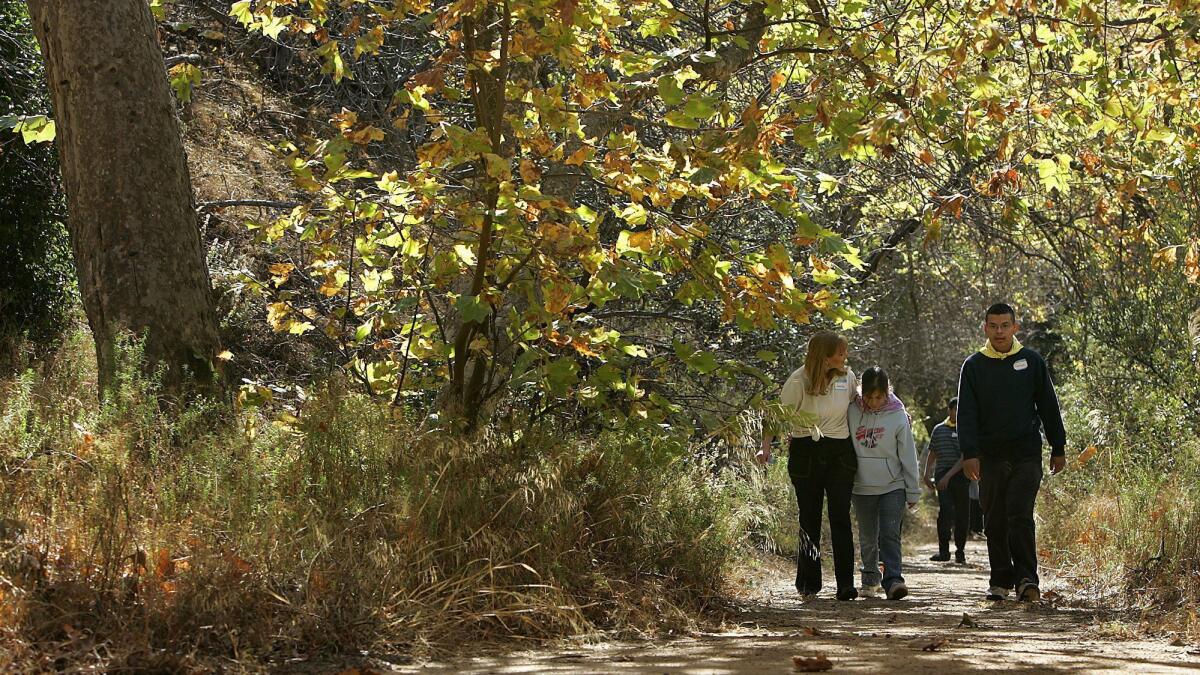Editorial: Reauthorize the Land and Water Conservation Fund. And make it permanent

- Share via
For more than 50 years, fees on offshore oil and gas drilling have provided billions of dollars for the federal Land and Water Conservation Fund to protect redwood forests, Joshua trees, beaches, mountains, parks, trails and other natural treasures in California — and similar assets around the nation. But the fund’s authorization expired at the end of September, and Congress left for its autumn recess without renewing it.
When it reconvenes in a lame duck session after Veterans Day, Congress should permanently reauthorize the fund and ensure that the fees are used for their intended purposes: to acquire and protect natural areas and to make grants to states for outdoor access and recreation.
It shouldn’t be this hard. The fund and the many projects it pays for have wide, bipartisan support. But reauthorization has become a pawn in ideological arguments over the federal government’s role in acquiring and holding land.
The Land and Water Conservation Fund is perhaps the least widely known, but by no means the least important, of six essential environmental programs created by Congress in the 1960s, largely under the leadership of Stewart Udall, who served as Interior secretary under Presidents Kennedy and Johnson. Ironically, the other five pieces of legislation — the Wilderness Act, the Water Quality Act, the Wild and Scenic Rivers Act, the Endangered Species Act, and the National Historic Preservation Act — may be better known because they have been, at various times, more controversial.
When it reconvenes in a lame duck session after Veterans Day, Congress should permanently reauthorize the fund.
On its adoption in 1964, the Land and Water Conservation Fund allowed the federal government to purchase land using revenue from recreation fees. A later amendment supplemented funding with royalties on oil and gas leases on the outer continental shelf, and those fees have now become the primary revenue source, to the tune of about $40 billion thus far.
Projects include acquisitions of narrow but crucial strips of land adjacent to national parks — for example, a parcel next to Joshua Tree National Park that was slated for real estate development — and access strips to open up existing public areas to recreation. A matching-grant program allows states to develop and enhance urban parkland, creating dozens of parks in Los Angeles County alone, including baseball and soccer fields.
Matching grants also can be used to protect water supplies. Many of the state and local bond measures that Californians have adopted to respond to drought and to provide water security rely on federal matching funds — and many of those matches have come from the Land and Water Conservation Fund.
Federal law allows up to $900 million to be appropriated each year, which is less than the amount of revenue flowing in; as a result, billions of dollars sit in the fund unused. But money doesn’t actually come out of the fund until Congress appropriates it. And Congress routinely did, with bipartisan backing and without controversy, until several years ago, when some lawmakers tried to link the fund and its grants to the controversy over federal land ownership and management in Western states.
Enter the Fray: First takes on the news of the minute from L.A. Times Opinion »
But even lawmakers who are partial to this so-called sagebrush rebellion recognize that the link between their grievances and the Land and Water Conservation Fund is weak. Just over three years ago, they tabled their philosophical arguments and reached a short-term deal to keep the fund in business. That deal expired on Sept. 30.
The House Committee on Natural Resources approved a reauthorization bill on Sept. 13. Shortly after the current authorization expired, a Senate committee advanced its own version of the proposal. But lawmakers disagreed over details and never got a bill to the floor of either chamber.
The danger now is that a final deal on the fund will fall through the cracks as lawmakers argue over funding for the border wall and other controversial topics. That would be a shame. It ought to be easy to reach final agreement on a bill for which there is bipartisan support. It is low-hanging fruit, and Congress ought to pluck it as soon as it reconvenes.
Follow the Opinion section on Twitter @latimesopinion and Facebook
More to Read
A cure for the common opinion
Get thought-provoking perspectives with our weekly newsletter.
You may occasionally receive promotional content from the Los Angeles Times.






